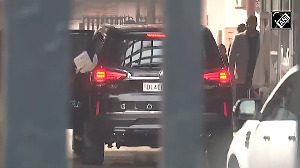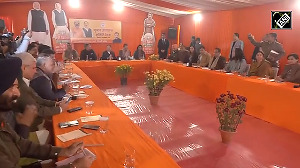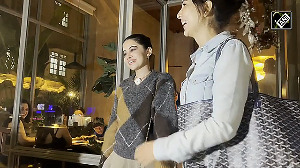The legendary composer Ravi passed into the ages on Wednesday, March 7, aged 86.
We salute Ravi's brilliant musical scores, with this interview he granted Rediff.com's Patcy N in 2006.
Whether they know it or not, most married folk in India have heard Ravi Sharma's music. It's unavoidable, considering he is the composer behind the classic Aaj Meri Yaar Ki Shaadi Hai from the film Aadmi Sadak Ka.
Unmarried folk have heard his work too. There's Baar Baar Dekho from China Town, for one, and Ae Meri Zohra Jabeen from Waqt.
For those who know and love the movies, Ravi -- as he likes to be called -- is a treasure. His story could probably make it as a script too, considering he rose from the post of lead singer at a Bhajan Mandali (choir specialising in religious hymns) to that of celebrated music director and winner of high honours from the Government of India.
Now in his eighties, Ravi says he has always loved singing, since childhood. People who heard him sing at the Bhajan Mandali asked him to go to Mumbai. They told him he would be famous because his voice resembled that of Mohammad Rafi.
Ravi was unconvinced. He wasn't confident enough about his voice, and stuck to his day job at the Post and Telegraph department in Delhi. After India gained Independence, he was transferred to Pathankot, but longed to go to Mumbai and try his luck at singing. Then, at the 1949 World Trade Fair in Delhi, he got his voice recorded and heard it for the first time. The results left him ecstatic. His voice really did resemble Rafi's!
A 23-year old Ravi made his decision. Taking 20 days off from work, he boarded a train to the city of dreams.
Throughout the journey, he rehearsed songs he planned to sing before music directors. His woes began the minute he arrived in Mumbai. As he was new to the city, he had no place to stay. He tried meeting music directors, but was rebuffed. Soon, his leave expired.
Ravi decided to stay back, extending his leave three times before finally resigning. His struggle continued.
Ravi recalls the days when he and his family lived in a rented house made of tin, in a warehouse that had no electricity. Worse, the house was adjacent to a godown that stocked chillies and cement.
Finally, after two-and-a-half years, Ravi saw the light at the end of the tunnel when composer Hemant Kumar gave him an opportunity to sing as a chorus singer in Anand Math. Hemantda happened to pronounce an Urdu word incorrectly, and Ravi corrected him.
The legendary music director was so pleased that he asked Ravi to join him. He worked on a lot of films with Hemantda and also began to get work outside, paid Rs 20 per song and Rs 2 per rehearsal. It would add up to a princely Rs 60 per month. He also began playing instruments like the tabla and harmonium.
Ravi says he owes a lot of his success to Devendra Goel and Hemant Kumar -- one gave him his first break as a composer in the movie Vachan, the other employed him as an assistant.
For the score for Nagin, Ravi created the sound of a snake charmer's flute, using the harmonium. People at Filmistan Studios liked it so much that he began being paid Rs 250 per month, apart from the Rs 200 for the films Hemant Kumar was working on. Then came a turning point in his life.
Hemant Kumar asked Ravi to start composing music on his own. The thought of losing his job came as a big shock, but the ever-helpful Hemant Kumar told Ravi that he would one day be a good music director if he worked independently. Hemantda said he would be wasting his talent if he simply hung around with him.
A dejected Ravi couldn't sleep that night. The next day, he met producer Karimbhai Nadiadwala, who heard his story and gave him a three-film contract.
Gradually, work started coming his way and his financial position improved.
Ravi had his own style. He would never create a tune without going through the lyrics first. He believes, to this day, that a lyric writer should not be bound by the tune, but should have the freedom to write whatever he wants.
Secondly, he would see to it that music played a subordinate role to poetry. He feels this is why he got the best poetry from his lyricists.
He still remembers the day Guru Dutt told him he was making Chaudhvin Ka Chand and asked him to compose the music. The director thought of asking lyricist Shakeel Badayuni who, at the time, worked only with Naushad. When Ravi met Badayuni, the poet told him he was worried as he had never worked with anyone other than Naushad.
Chaudhvin Ka Chand was Ravi's ticket to popularity. Soon after, B R Chopra approached him for Gumraah. One after the other, Ravi's movies hit the jackpot. At one point, he says beaming, there were twelve releases a month.
Years later, producers began asking Ravi for more modern music, of the 'hotchpotch' sort more popular now. He turned them down, reasoning that he was from a generation that made melodious music.
Today, the dilemma that dogs him is who should he write for or, even if he does write something, who will sing it. Mohammad Rafi, Mukesh and Kishore Kumar are no more. Writers like Shakeel Badayuni, Sahir Ludhianvi, Majrooh Sultanpuri, Asad Bhopali and S H Bihari have passed into the ages.
His last Hindi film was Khamosh Nigahein, which never made it to the theatres. Ravi still gets royalties for his songs. His song from Waqt, Ae Meri Zohra Jabeen was used in the Shah Rukh Khan mega hit Dilwale Dulhaniya Le Jaayenge.
When Malayalam director Hariharan and legendary novelist M T Vasudevan Nair sought his music for a Malayalam film, Ravi didn't hesitate. He had done two Gujarati films and even received an award from the Gujarat government.
Two of the films he scored music for -- Panchagni and Nakhshathangal -- won him awards from the Kerala government. He soon became popular as a composer in Malayalam cinema and has done about 17 films.
Ravi feels that music today has undergone a tremendous change. For him, yesteryear's music was the real deal. Today's sound is more artificial. He also believes that, with the advent of computers, a composer need not be very talented any more. A push of a button creates synthesised music; the real tone of the instrument is missing.
"Even for singers, we have to search for talent these days," he says. "Songs like Papa Kehte Hai aren't difficult to sing. Even my servant can manage a track like that. I'm not saying the singers aren't talented; maybe they are, but aren't given good songs." He also dislikes the way music is being copied. Today, all of it sounds similar.
Ravi also has a word or two to say about remixes. "They are bad," he tells me. "Something that is old should be kept old. If you try and change the Taj Mahal from marble to granite, it won't work."
"I request the makers of these remixes -- if you are so interested in making albums with scantily clad dancers, why don't you create new songs?" says the legendary composer.
"Why do you want to spoil the old ones? Even my songs are remixed. I don't like it, I have no hold over it, and we aren't even credited for the music!"
Also see: Ravi remembers Rafi







 © 2025 Rediff.com -
© 2025 Rediff.com -